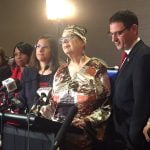
The UCAS data shows a 9% drop in applications for courses with an October deadline, which include medicine, dentistry and all courses at the Universities of Cambridge and Oxford.
“It is important also that we make clear that European students continue to be welcome”
The fall from 6,860 EU student applications to these courses last year to 6,240 this year was outweighed by a 3% bump in applications from domestic students to 39,440. There was also a 1% rise in applications from non-EU students to study in the UK from autumn 2017.
However, it nevertheless marks the end of several years of consecutive increases in the number of EU applications.
It’s not yet known whether the drop in early applications will extend to other subject areas and universities, most of which close in January.
“We will be watching the numbers of EU applications in the run-up to the January deadline, especially now that the government has confirmed arrangements for continuing access to student loans for 2017 courses,” commented Mary Curnock Cook, chief executive of UCAS.
Applications for the early deadline period opened in September, at which point there was widespread uncertainty over whether EU students would be able to access student loans and grants, and whether they would continue to pay domestic student fees.
In fact, it was not until October 11 – four days before the deadline – that Universities Minister Jo Johnson confirmed funding and fees arrangements would remain unchanged for EU students enrolling in 2017. Similar pledges for Wales and Scotland followed shortly thereafter.
Nicola Dandridge, chief executive of Universities UK, said that the figures highlight the importance of ensuring prospective European applicants understand fees and financial support arrangements “well in advance of the applications window”.
“It is important also that we make clear that European students continue to be welcome in coming to the UK to study,” she added, but stressed that demand for UK higher education “remains strong” due to its reputation for quality.
A government spokesperson said it is “too early in the application cycle to predict reliable trends”.
[Source:-The Pie news]








